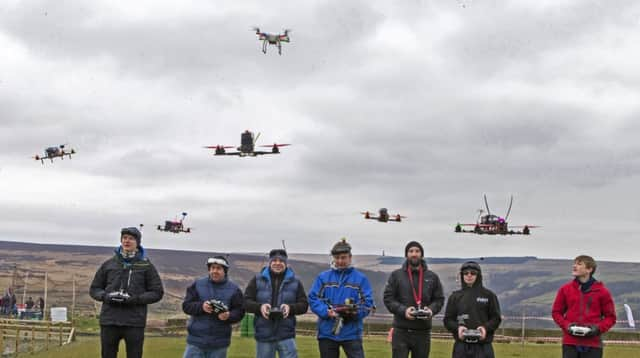Drones could boost British economy by £42bn


But a major new report predicts that harnessing the untapped commercial potential of drones could bolster the country’s coffers to the tune of tens of billions of pounds.
Research carried out by PricewaterhouseCoopers (PwC) suggests that the widespread use of the unmanned aerial vehicles could generate as much as £42 billion for the British economy by 2030.
Advertisement
Hide AdAdvertisement
Hide AdThe accountancy giant said it expects there to be more than 76,000 drones in operation across the UK by the end of the next decade, an army of devices which, it says, should not simply be used for filming or taking bird’s eye view photographs.
The PwC report proposes that more than 25,000 of the drones could be utilised by the public sector and used in areas such as health, education, and defence.
The biggest boost to output is forecast to come from the wholesale and retail trade sector, although industries such as agriculture, construction and manufacturing will also benefit.
Elaine Whyte, part of PwC’s intelligent digital division, said: “Drones have the potential to offer a powerful new perspective for businesses across a variety of industries, delivering both productivity benefits and increased value from the data they collect.
“The UK has the opportunity to be at the leading edge of exploiting this emerging technology, and now is the time for investments to be made in developing the use cases and trial projects needed to kickstart our drone industry.”
She added: “I envisage that the advantages of drone technology will be well established within the decade – not only for business purposes, but also for helping to protect our society, for example, through being used by the emergency services.”
PwC’s report also found that drone technology could help the UK achieve up to £16bn in net cost savings by 2030 through increased productivity. Only time will tell if PwC’s predictions are accurate, but the company does have a vested interest in ensuring its optimistic forecasts are borne out. It operates a drone division designed to help its clients around the world maximise the potential of the emerging technology.
There is also a steep regulatory hill to climb before the use of drones can be become as ubiquitous as PwC suggests.
Advertisement
Hide AdAdvertisement
Hide AdAs things stand, drone owners are required to keep their devices within their own line of sight unless they have been given special permission to do otherwise, a stipulation which has put paid to the idea of online retailers using drones to deliver goods.
While a drone-tracking system is under development by Nats, the air traffic control service, and a start-up firm called Altitude Angel, it is not yet ready or approved for use.
Amazon has successfully carried out small scale private trials of deliveries in the UK, with the first test seeing a customer in Cambridgeshire receive a selection of books just 13 minutes after placing their order.
However, aviation authorities in the US are stealing a march on the UK.
Earlier this month, the Trump administration’s transport secretary, Elaine Chao, announced ten test projects that will bring the unmanned aircraft into the skies.
“Our country is on the verge of the most significant new development in aviation since the emergence of the jet age,” Ms Chao said.
“We’ve got to create a path forward for the safe integration of drones if our country is to remain a global aviation leader and reap the safety and economic benefits drones have to offer.”